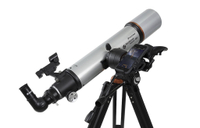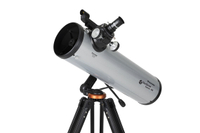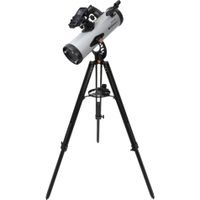Save up to $200 on these Celestron StarSense Explorer telescopes in Adorama's year-end sale
The sale includes a great deal on the Celestron StarSense Explorer DX 102AZ.

The holidays may be behind us, but a whole new year of stargazing awaits in 2022 and Adorama is currently offering this powerful Celestron StarSense Explorer DX telescope for $200 off right now.
You can get the Celestron StarSense Explorer DX 102AZ refractor telescope for $399.95 at Adorama right now, a 33% savings off its normal price of $599.95, to gear up for the new year. This deal is at the top of our list for best telescope deals available now, but Adorama also has offers on two others depending on your needs.
Celestron is a proven telescope manufacturer with a wide variety of instruments available. The StarSense Explorer DX 102AZ telescope is designed to work in conjunction with Celestron's free StarSense Explorer smartphone app to locate objects in the night sky based on your smartphone's position.
Celestron StarSense Explorer DX 102AZ $599.95 now $399.95 at Adorama
Our reviewer found this StarSense Explorer DX 102AZ refractor telescope an excellent choice for beginners, and its 33% off sale is a significant savings.
This version of the Celestron StarSense DX 102AZ is a manual telescope that uses the StarSense app to guide users to find objects that are currently visible in their night sky. Our reviewer found it a breeze to use, adding that the combination of powerful optics (it has a 102-mm aperture for light gathering) and its smartphone guide can make it fun and easy for stargazers just starting out.
The manual version on sale now comes with a smartphone dock that does not cover up the eyepiece but does need to be aligned with the telescope's optics, a process that is designed to a take a few minutes. Once aligned, the app generates a list of what's visible in your night sky to choose from, then displays direction arrows indicating where to move the instrument to bring the object in view.
It comes with a tripod and mount, as well as two eyepieces with magnifications of 26X and 66X, and a StarPointer red dot finderscope.
Users of the telescope app have hailed its ease of use to find Saturn's rings and the moons of Jupiter, as well as star clusters and galaxies. Our reviewer found this Celestron telescope more suited for beginners than for dedicated observers but noted that its smartphone app connection made for one of the quickest-ever alignment periods and night sky object finding times they'd ever seen.
Get the Space.com Newsletter
Breaking space news, the latest updates on rocket launches, skywatching events and more!
If you're looking for a little more power for your stargazing sessions, you may want to consider the Celestron StarSense DX 130AZ reflector telescope, which is currently on sale for $429.95 at Adorama, saving you 28% — or $170 — off its normal $599.95 price.
Celestron StarSense Explorer DX 130AZ was $599.95 now $429.95
At $170 off, Celestron's DX 130AZ is ideal for spotting galaxies, planets and nebulas. Its price can shoot up above $700, so this 28% off deal is one not to miss if you're looking for more power and ease of use.
Like the 102AZ, the 130AZ reflector works with Celestron's StarSense app to help users get started quickly. But it also has a larger objective lens at 130 mm, which is designed to resolve the cloud bands on Jupiter, details of the Orion nebula and more.
Our reviewer found the Celestron StarSense Explorer DX 130AX ideal for observing galaxies, planets and star clusters, and noted that it can be used for basic astrophotography by beginners.
In addition to its tripod and smartphone mount, this telescope comes with two eyepieces that offer magnifications of 26X and 65X, and a StarPointer red dot finderscope.
If the above telescopes are a bit steep for you, but you're still looking for an easy setup, you may want to opt for Celestron's StarSense Explorer LT 114AZ, which is currently on sale for $189.95 at Adorama, saving you $75 off its normal $264.95 price.
Like the above telescopes, this instrument works with the StarSense app to make it easy for newcomers to use. It is a reflector telescope instead of a refractor, like the ones above, but has a larger objective lens than the 102-mm refractor. It's designed to offer crisp views of Jupiter's Great Red Spot and Saturn's rings, as well as nebulas and star clusters.
It comes with two eyepieces that offer magnifications of up to 40X and 100X, respectively, and the traditional StarPointer red dot finderscope.
Celestron StarSense Explorer LT 114AZ telescope was $264.95 now $189.95
If you're on a budget, this telescope is an excellent option at 28% off, offering beginners and veteran skywatchers quick access to solar system and distant deep-sky targets.
Whatever your telescope needs, now is a great time to pick up a telescope to prepare for night sky events in 2022.
Be sure to check out Space.com's best telescope deals for more sales, as well as our guide to the best telescopes. If you're looking for a telescope for a young skywatcher or beginner, then read our guides on the best telescopes for kids or best telescopes for beginners.
Join our Space Forums to keep talking space on the latest missions, night sky and more! And if you have a news tip, correction or comment, let us know at: community@space.com.

Tariq is the Editor-in-Chief of Space.com and joined the team in 2001, first as an intern and staff writer, and later as an editor. He covers human spaceflight, exploration and space science, as well as skywatching and entertainment. He became Space.com's Managing Editor in 2009 and Editor-in-Chief in 2019. Before joining Space.com, Tariq was a staff reporter for The Los Angeles Times covering education and city beats in La Habra, Fullerton and Huntington Beach. In October 2022, Tariq received the Harry Kolcum Award for excellence in space reporting from the National Space Club Florida Committee. He is also an Eagle Scout (yes, he has the Space Exploration merit badge) and went to Space Camp four times as a kid and a fifth time as an adult. He has journalism degrees from the University of Southern California and New York University. You can find Tariq at Space.com and as the co-host to the This Week In Space podcast with space historian Rod Pyle on the TWiT network. To see his latest project, you can follow Tariq on Twitter @tariqjmalik.













